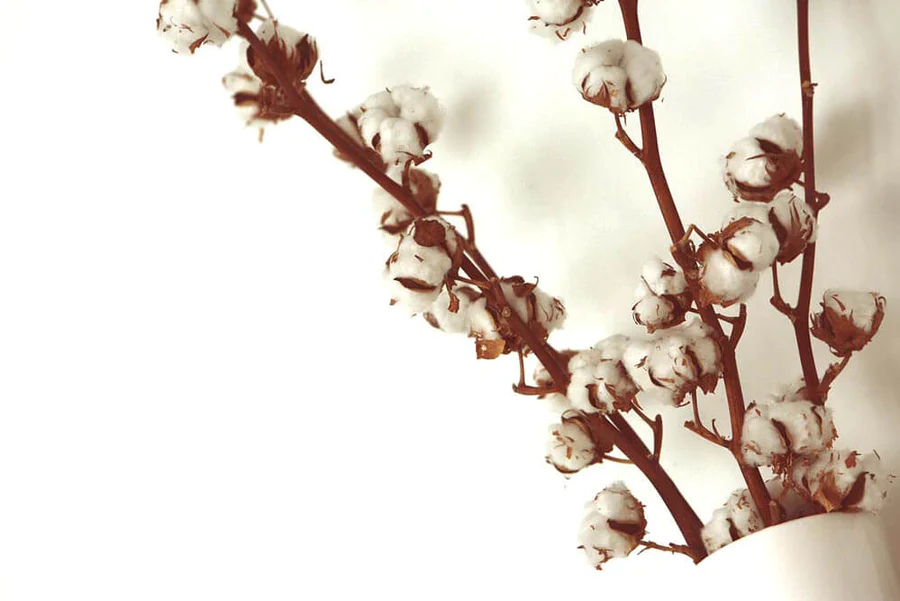Table of Contents
When buying clothing and other textiles, natural is always best. The first use of the cotton plant as threads to make textiles date back to 1000BC. Since then, cotton has grown into a multi-billion dollar industry. Nowadays, plant-sourced fibres are near impossible to avoid. Cotton is not only used to make clothing, but also furnishings, bookbinding, fishnets, diapers and, of course, cotton balls – it’s everywhere! But how ethical and sustainable is the cotton industry?
We’re seeing more and more cotton items in the stores dubbed ‘organic’ – but what does that really mean? What is organic cotton? And what’s the difference between this and standard cotton? Keep reading to learn everything you need to know about standard cotton vs. organic cotton.
How is cotton made?
You probably already know that cotton is a plant, but do you know how it becomes the clothing on your back? Cotton grows in warm climates. Together, India and China dominate the cotton industries producing a combined 12 million metric tonnes of cotton per year.
This cotton is grown, picked, processed and spun into yarn which is eventually used to create the clothes, furnishings and other household textiles we use every single day.
Cotton vs. organic cotton: what’s the difference?
So now we know where cotton comes from and how it has become our favorite clothes, we now come to ask: what is organic cotton? Just like with food, “organic” is a verification given by third-party organisations. In order to qualify as organic, a product must have a low impact on the environment, be cultivated without toxic chemicals and efforts must be made to maximise soil fertility. When you’re buying organic, you’re safe in the knowledge than there’s no toxic pesticides or synthetic fertilizers used in the process. Can I get an AMEN?
Organic cotton producers also say no to GMO. As a result of all these factors, the cotton produced is higher quality, better for the environment and safe for our skin. However, the yield is often smaller – which is why organic is often a little more expensive than that of the mass-produced cotton textiles we’re used to.

Why should I buy organic?
Just because we don’t eat cotton, it doesn’t make organic any less important. There are a few reasons why we should always choose organic cotton when given the choice.
The first is that it is created in a much more ethical manner. Cotton is a huge crop – 25% of the world’s insecticides and 10% of pesticides are used on cotton crops alone. These pesticides and other chemicals used to cultivate cotton are incredibly harmful to the farmers in these developing countries. In fact, the chemicals pose a long term health risk for farmers and their families.
Whether it’s the risk of cancer or suicide, the facts really are shocking. If you’re keen to learn more about the true victims of the world’s cotton addiction, watch The True Cost on Netflix. This documentary explores the fast fashion industry all the way from field to shop front. You’ll learn all about the injustices of mass-produced cotton along with the benefits of choosing organic, for you and the farmers.
It’s not just the farmers who suffer, wildlife is affected by the chemicals too. U.S. Fish and Wildlife Service reports that pesticides are responsible for the deaths of 67 million birds annually in the U.S. Imagine the impact on the planet’s wider biodiversity, especially the oceans. We’ll never really know the true damage that cotton has caused.
If you care about the planet, then buying organic cotton should be at the top of your list. We can only begin to comprehend the wider environmental impact of cotton. It takes 2,700 litres of water to make one cotton t-shirt. Not only that, but the non-organic cotton industry produces an estimated 220 million tonnes of greenhouse gases a year.
So, if these chemicals are so dangerous and even fatal, then why would we want them near our skin? The truth is, we don’t. By choosing organic cotton, you’re saying no to these inhumane practices, the environmental damage and nasty chemicals. Protecting your skin and the planet at the same time – what’s better than that?

Making smarter choices
Next time you’re in the store, consider these facts when choosing cotton vs. organic cotton. By choosing organic cotton, you’re saying no to unfair working conditions, toxic chemicals, environmental damage on a local and global level, and long term damage to yours and your loved ones’ skin. The way we see it, you vote with your dollar – so make sure you always vote for something you believe in. That’s why we only use organic cotton when producing our shopping and produce bags, proudly certified by the Global Organic Textile Standard.
So, next time a friend asks: what is organic cotton? You’ll be equipped with the facts you need to share the important message of why organic is best for the planet, the people and our health.
Sources and further information on the topic:
https://www.mordorintelligence.com/industry-reports/cotton-market
https://www.statista.com/statistics/263055/cotton-production-worldwide-by-top-countries/
https://www.ecochoices.com/1/cotton_statistics.html
https://www.commonobjective.co/#eff
https://www.huffpost.com/entry/organic-cotton-sustainable-fashion_b_3562788
https://www.swedishlinens.com/blogs/news/organic-vs-conventional-cotton
